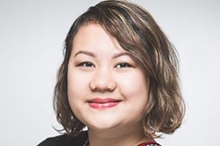Building Bridges for Refugees from Burma

Mone Aye is being honored as a White House Champion of Change for World Refugees.
I was born in a camp for refugees from Burma, located in Thailand, and lived there until I was 19. In 2007, when finally given the opportunity to, my family applied to come to the United States and was accepted. We moved to Iowa, as do many refugees from Burma, and, finding it to be the perfect place for our family to settle down, we’ve made it our home ever since. Living in a new country with a new culture and having to start our lives over again has been challenging for us. When we first arrived, we didn’t know much English, so even getting to doctors’ appointments was difficult. There were services available to us, but, with cultural and linguistic barriers, we didn’t know how to access them.
In 2011, I co-founded the Ethnic Minorities of Burma Advocacy and Resource Center (EMBARC) along with 5 other ethnic community members: Mu Law, Ree Reh, Ro Sang, Thway Kaw Paw, and Henny Ohr, our Executive Director. We wanted to combine the efforts of the ethnic minority members living in Des Moines to achieve a better quality of life. Although EMBARC has dedicated staff, volunteerism is essential to the sustainability of the organization. Members of the Board, primarily refugees from Burma, volunteer their time to assist newcomers and provide direction to the EMBARC administration. They are inspired by their common goal of helping refugees succeed. Other refugees provide critical support to newcomers through activities coordinated by EMBARC, such as its Refugee Navigator and AmeriCorps Refugee RISE programs. These programs are designed to empower those they seek to help by providing them with resources to create self-sustaining, community-based support systems.
I have served as the board president for the ethnic community-based organization (ECBO), EMBARC, since its formation. From the initial community meeting in 2011, EMBARC has obtained 501(c)3 status, and received a significant federal grant from the U.S. Department of Health and Human Services and Administration for Children and Families. EMBARC continues the practice of supporting the oppressed and helping refugees from Burma succeed. It has programs to address current needs and to determine any new initiatives that may be needed. EMBARC understands the needs of the refugee community; we understand their resources—both tangible and intangible—and encourage and model success and independence, while showing compassion in leading folks to resources.
In 2014, I became a United States citizen. As an individual that was born displaced, I personally consider my citizenship to be one of my greatest accomplishments. In 2015, I passed the last of my HiSET (GED) exams and am looking forward to earning a college degree. I have a family, a job that serves my community (Bilingual Outreach Worker for Des Moines Public Schools), I teach English classes on Saturdays, and do whatever it takes to ensure the safety and comfort of my community members as a board member of EMBARC.
Mone Aye was instrumental in establishing the Ethnic Minorities of Burma Advocacy and Resource Center (EMBARC), a non-profit created by and for refugees from Burma in Iowa.
White House Blogs
- The White House Blog
- Middle Class Task Force
- Council of Economic Advisers
- Council on Environmental Quality
- Council on Women and Girls
- Office of Intergovernmental Affairs
- Office of Management and Budget
- Office of Public Engagement
- Office of Science & Tech Policy
- Office of Urban Affairs
- Open Government
- Faith and Neighborhood Partnerships
- Social Innovation and Civic Participation
- US Trade Representative
- Office National Drug Control Policy
categories
- AIDS Policy
- Alaska
- Blueprint for an America Built to Last
- Budget
- Civil Rights
- Defense
- Disabilities
- Economy
- Education
- Energy and Environment
- Equal Pay
- Ethics
- Faith Based
- Fiscal Responsibility
- Foreign Policy
- Grab Bag
- Health Care
- Homeland Security
- Immigration
- Innovation Fellows
- Inside the White House
- Middle Class Security
- Open Government
- Poverty
- Rural
- Seniors and Social Security
- Service
- Social Innovation
- State of the Union
- Taxes
- Technology
- Urban Policy
- Veterans
- Violence Prevention
- White House Internships
- Women
- Working Families
- Additional Issues

